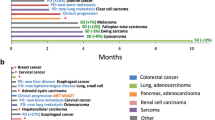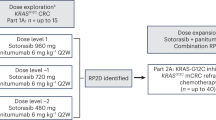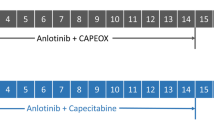Summary
Purpose Dasatinib inhibits src family kinases and has anti-angiogenic properties. We conducted a phase I study of dasatinib, capecitabine, oxaliplatin, and bevacizumab (CapeOx/bevacizumab), with an expansion cohort in metastatic colorectal cancer (CRC). Methods Patients were enrolled in a dose escalation cohort to establish the maximum tolerated dose (MTD) and the recommended phase II dose (RP2D). Using a “3 + 3” design, twelve patients with advanced solid tumors received dasatinib (50 mg twice daily or 70 mg daily), capecitabine (850 mg/m2 twice daily, days 1–14), oxaliplatin (130 mg/m2 on day 1) and bevacizumab (7.5 mg/kg on day1), every 3 weeks. Ten patients with previously untreated metastatic CRC were then enrolled in an expansion cohort. Activated src (srcact) expression was measured by immunohistochemistry, using an antibody that selectively recognizes the active conformation of src (clone 28). Results Twenty-two patients were enrolled between June 2009 and May 2011. Two DLTs were observed in the 50 mg bid dasatinib cohort, and one DLT was observed in the 70 mg daily dasatinib cohort. The MTD and RP2D for dasatinib was 70 mg daily. The most common treatment-related adverse events were fatigue (20; 91 %) and diarrhea (18; 82 %). Biomarker analysis of srcact expression demonstrated that the overall response rate (ORR) was 75 % (6/8) for patients with high srcact expression (IHC ≥ 2), compared to 0 % (0/8) for patients with low srcact expression (IHC 0 or 1); (p = 0.007). Conclusions The RP2D of dasatinib is 70 mg daily in combination with CapeOx/bevacizumab. High levels of srcact expression may predict those patients most likely to benefit from dasatinib.



Similar content being viewed by others
References
Aligayer H, Boyd DD, Heiss MM, Abdalla EK, Curley SA, Gallick GE (2002) Activation of Src kinase in primary colorectal carcinoma: an indicator of poor clinical prognosis. Cancer 94:344–351
Araujo JC, Trudel GC, Saad F, Armstrong AJ, Yu EY, Bellmunt J, Wilding G, McCaffrey J, Serrano SV, Matveev V, Efstathiou E, Oudard S, Morris MJ, Sizer B, Goebell PJ, Bono JSD, Paliwal P, Durham S, Cheng S, Logothetis C (2013) Overall survival (OS) and safety of dasatinib/docetaxel versus docetaxel in patients with metastatic castration-resistant prostate cancer (mCRPC): results from the randomized phase III READY trial. J Clin Oncol: suppl 6; abstr LBA8
Bolen JB, Veillette A, Schwartz AM, DeSeau V, Rosen N (1987) Activation of pp 60c-src protein kinase activity in human colon carcinoma. Proc Natl Acad Sci U S A 84:2251–2255
Cartwright CA, Kamps MP, Meisler AI, Pipas JM, Eckhart W (1989) pp 60c-src activation in human colon carcinoma. J Clin Invest 83:2025–2033
Ceppi P, Papotti M, Monica V, Lo Iacono M, Saviozzi S, Pautasso M, Novello S, Mussino S, Bracco E, Volante M, Scagliotti GV (2009) Effects of Src kinase inhibition induced by dasatinib in non-small cell lung cancer cell lines treated with cisplatin. Mol Cancer Ther 8:3066–3074
Cortes J, Specht J, Gradishar W, Strauss L, Rybicki A, Wu X et al (2009) Dasatinib plus capecitabine for advanced breast cancer: safety and efficacy data from phase 1 study CA180-004. Cancer Res 69:S676–677
Ellis LM, Staley CA, Liu W, Fleming RY, Parikh NU, Bucana CD, Gallick GE (1998) Down-regulation of vascular endothelial growth factor in a human colon carcinoma cell line transfected with an antisense expression vector specific for c-src. J Biol Chem 273:1052–1057
Fei F, Yu Y, Schmitt A, Rojewski MT, Chen B, Gotz M, Dohner H, Bunjes D, Schmitt M (2009) Dasatinib inhibits the proliferation and function of CD4 + CD25+ regulatory T cells. Br J Haematol 144:195–205
Ferlay J, Shin H, Bray F, Forman D, Mathers C, Parkin D GLOBOCAN (2008) v2.0, Cancer incidence and mortality worldwide: IARC CancerBase No. 10 [Internet]. Available from: http://globocan.iarc.fr, accessed on 7 June 2013
Fornier MN, Morris PG, Abbruzzi A, D’Andrea G, Gilewski T, Bromberg J, Dang CT, Dickler, MN, Norton L, Hudis C (2010) Dasatinib (D) in combination with weekly (w) paclitaxel (P) for patients (pts) with metastatic breast carcinoma (MBC): a phase I/II study. J Clin Oncol 28: abstr 1156
Griffiths GJ, Koh MY, Brunton VG, Cawthorne C, Reeves NA, Greaves M, Tilby MJ, Pearson DG, Ottley CJ, Workman P, Frame MC, Dive C (2004) Expression of kinase-defective mutants of c-Src in human metastatic colon cancer cells decreases Bcl-xL and increases oxaliplatin- and Fas-induced apoptosis. J Biol Chem 279:46113–46121
Hanks BA, Holtzhausen A, Gimpel P, Jamieson R, Campbell OM, Sun L, Augustine CK, Tyler DS, Osada T, Morse M, Ling LE, Lyerly HK, Blobe GC (2012) Effect of the loss of the type III TGFβ receptor during tumor progression on tumor microenvironment: preclinical development of TGFβ inhibition and TGFβ-related biomarkers to enhance immunotherapy efficacy. J Clin Oncol 30: suppl; abstr 10563
Haura EB, Tanvetyanon T, Chiappori A, Williams C, Simon G, Antonia S, Gray J, Litschauer S, Tetteh L, Neuger A, Song L, Rawal B, Schell MJ, Bepler G (2010) Phase I/II study of the Src inhibitor dasatinib in combination with erlotinib in advanced non-small-cell lung cancer. J Clin Oncol 28:1387–1394
Herold CI, Chadaram V, Peterson BL, Marcom PK, Hopkins J, Kimmick GG, Favaro J, Hamilton E, Welch RA, Bacus S, Blackwell KL (2011) Phase II trial of dasatinib in patients with metastatic breast cancer using real-time pharmacodynamic tissue biomarkers of Src inhibition to escalate dosing. Clin Cancer Res 17:6061–6070
Hochster HS, Hart LL, Ramanathan RK, Childs BH, Hainsworth JD, Cohn AL, Wong L, Fehrenbacher L, Abubakr Y, Saif MW, Schwartzberg L, Hedrick E (2008) Safety and efficacy of oxaliplatin and fluoropyrimidine regimens with or without bevacizumab as first-line treatment of metastatic colorectal cancer: results of the TREE Study. J Clin Oncol 26:3523–3529
Ischenko I, Camaj P, Seeliger H, Kleespies A, Guba M, De Toni EN, Schwarz B, Graeb C, Eichhorn ME, Jauch KW, Bruns CJ (2008) Inhibition of Src tyrosine kinase reverts chemoresistance toward 5-fluorouracil in human pancreatic carcinoma cells: an involvement of epidermal growth factor receptor signaling. Oncogene 27:7212–7222
Johnson FM, Bekele BN, Feng L, Wistuba I, Tang XM, Tran HT, Erasmus JJ, Hwang LL, Takebe N, Blumenschein GR, Lippman SM, Stewart DJ (2010) Phase II study of dasatinib in patients with advanced non-small-cell lung cancer. J Clin Oncol 28:4609–4615
Kawakatsu H, Sakai T, Takagaki Y, Shinoda Y, Saito M, Owada MK, Yano J (1996) A new monoclonal antibody which selectively recognizes the active form of Src tyrosine kinase. J Biol Chem 271:5680–5685
Kim G, Annunziata CM, Sarosy GA, Minasian LM, Prindiville SA, Zujewski J, Otten L, Squires J, Houston ND, Kohn EC (2010) Phase I study of dasatinib in combination with bevacizumab in advanced solid tumors. J Clin Oncol 28: suppl; abstr TPS163
Kim LC, Song L, Haura EB (2009) Src kinases as therapeutic targets for cancer. Nat Rev Clin Oncol 6:587–595
Kim MP, Park SI, Kopetz S, Gallick GE (2009) Src family kinases as mediators of endothelial permeability: effects on inflammation and metastasis. Cell Tissue Res 335:249–259
Kim YM, Lee YM, Kim HS, Kim JD, Choi Y, Kim KW, Lee SY, Kwon YG (2002) TNF-related activation-induced cytokine (TRANCE) induces angiogenesis through the activation of Src and phospholipase C (PLC) in human endothelial cells. J Biol Chem 277:6799–6805
Kopetz S, Lesslie DP, Dallas NA, Park SI, Johnson M, Parikh NU, Kim MP, Abbruzzese JL, Ellis LM, Chandra J, Gallick GE (2009) Synergistic activity of the SRC family kinase inhibitor dasatinib and oxaliplatin in colon carcinoma cells is mediated by oxidative stress. Cancer Res 69:3842–3849
Kopetz S, Wolff RA, Glover K, Henry L, Eng C, Chang DZ, Overman M, Gallick G, Abbruzzese J (2008) Phase I study of Src inhibition with dasatinib in combination with 5-fluoruracil, leucovorin, oxaliplatin (FOLFOX) and cetuximab in metastatic colorectal cancer. (abstract 325). Paper presented at the 2008 GI Cancers Symposium, Orlando, FL. http://www.asco.org/ASCOv2/Meetings/Abstracts?&vmview=abst_detail_view&confID=53&abstractID=10340
Liu Y, Starr MD, Bulusu A, Pang H, Wong NS, Honeycutt W, Amara A, Hurwitz HI, Nixon AB (2013) Correlation of angiogenic biomarker signatures with clinical outcomes in metastatic colorectal cancer patients receiving capecitabine, oxaliplatin, and bevacizumab. Cancer Med 2:234–242
Lombardo LJ, Lee FY, Chen P, Norris D, Barrish JC, Behnia K, Castaneda S, Cornelius LA, Das J, Doweyko AM, Fairchild C, Hunt JT, Inigo I, Johnston K, Kamath A, Kan D, Klei H, Marathe P, Pang S, Peterson R, Pitt S, Schieven GL, Schmidt RJ, Tokarski J, Wen ML, Wityak J, Borzilleri RM (2004) Discovery of N-(2-chloro-6-methyl- phenyl)-2-(6-(4-(2-hydroxyethyl)- piperazin-1-yl)-2-methylpyrimidin-4- ylamino)thiazole-5-carboxamide (BMS-354825), a dual Src/Abl kinase inhibitor with potent antitumor activity in preclinical assays. J Med Chem 47:6658–6661
Mao W, Irby R, Coppola D, Fu L, Wloch M, Turner J, Yu H, Garcia R, Jove R, Yeatman TJ (1997) Activation of c-Src by receptor tyrosine kinases in human colon cancer cells with high metastatic potential. Oncogene 15:3083–3090
Puls LN, Eadens M, Messersmith W (2011) Current status of SRC inhibitors in solid tumor malignancies. Oncologist 16:566–578
Saltz LB, Clarke S, Diaz-Rubio E, Scheithauer W, Figer A, Wong R, Koski S, Lichinitser M, Yang TS, Rivera F, Couture F, Sirzen F, Cassidy J (2008) Bevacizumab in combination with oxaliplatin-based chemotherapy as first-line therapy in metastatic colorectal cancer: a randomized phase III study. J Clin Oncol 26:2013–2019
Secord AA, Teoh DK, Barry WT, Yu M, Broadwater G, Havrilesky LJ, Lee PS, Berchuck A, Lancaster J, Wenham RM (2012) A phase I trial of dasatinib, an SRC-family kinase inhibitor, in combination with paclitaxel and carboplatin in patients with advanced or recurrent ovarian cancer. Clin Cancer Res 18:5489–5498
Sharma MR, Wroblewski K, Polite BN, Knost JA, Wallace JA, Modi S, Sleckman BG, Taber D, Vokes EE, Stadler WM, Kindler HL (2012) Dasatinib in previously treated metastatic colorectal cancer: a phase II trial of the University of Chicago Phase II Consortium. Invest New Drugs 30:1211–1215
SPRYCEL [package insert]. Bristol-Myers Squibb, Princeton, NJ; October 2011. Retrieved [accessed August 7, 2012, from http://packageinserts.bms.com/pi/pi_sprycel.pdf
Talamonti MS, Roh MS, Curley SA, Gallick GE (1993) Increase in activity and level of pp 60c-src in progressive stages of human colorectal cancer. J Clin Invest 91:53–60
Termuhlen PM, Curley SA, Talamonti MS, Saboorian MH, Gallick GE (1993) Site-specific differences in pp 60c-src activity in human colorectal metastases. J Surg Res 54:293–298
Thomas SM, Brugge JS (1997) Cellular functions regulated by Src family kinases. Annu Rev Cell Dev Biol 13:513–609
Wiener JR, Windham TC, Estrella VC, Parikh NU, Thall PF, Deavers MT, Bast RC, Mills GB, Gallick GE (2003) Activated SRC protein tyrosine kinase is overexpressed in late-stage human ovarian cancers. Gynecol Oncol 88:73–79
Willett CG, Duda DG, di Tomaso E, Boucher Y, Ancukiewicz M, Sahani DV, Lahdenranta J, Chung DC, Fischman AJ, Lauwers GY, Shellito P, Czito BG, Wong TZ, Paulson E, Poleski M, Vujaskovic Z, Bentley R, Chen HX, Clark JW, Jain RK (2009) Efficacy, safety, and biomarkers of neoadjuvant bevacizumab, radiation therapy, and fluorouracil in rectal cancer: a multidisciplinary phase II study. J Clin Oncol 27:3020–3026
Wilson GR, Cramer A, Welman A, Knox F, Swindell R, Kawakatsu H, Clarke RB, Dive C, Bundred NJ (2006) Activated c-SRC in ductal carcinoma in situ correlates with high tumour grade, high proliferation and HER2 positivity. Br J Cancer 95:1410–1414
Yeatman TJ (2004) A renaissance for SRC. Nat Rev Cancer 4:470–480
Acknowledgments
We gratefully acknowledge the invaluable contributions of the patients and their families. We would also like to acknowledge the Duke University GI Oncology clinical trials team.
Conflict of interest
A.B.. Nixon, H.E. Uronis, M.A. Morse and H. I. Hurwitz currently have research funding with Bristol-Myers Squibb (BMS). M.A. Morse has received honoraria for speaking from Bristol-Myers Squibb. All other authors have declared no conflict of interest with BMS.
Role of the funding source
This was an investigator initiated study supported by Bristol-Myers Squibb, New Jersey, USA. The study was independently managed and analyzed. The final responsibility for the manuscript and the decision to submit for publication was made by the investigators. This work was also supported by National Institute of Health Grant 5K24-CA113755-05 (H Hurwitz).
Author information
Authors and Affiliations
Corresponding author
Rights and permissions
About this article
Cite this article
Strickler, J.H., McCall, S., Nixon, A.B. et al. Phase I study of dasatinib in combination with capecitabine, oxaliplatin and bevacizumab followed by an expanded cohort in previously untreated metastatic colorectal cancer. Invest New Drugs 32, 330–339 (2014). https://doi.org/10.1007/s10637-013-0042-9
Received:
Accepted:
Published:
Issue Date:
DOI: https://doi.org/10.1007/s10637-013-0042-9




